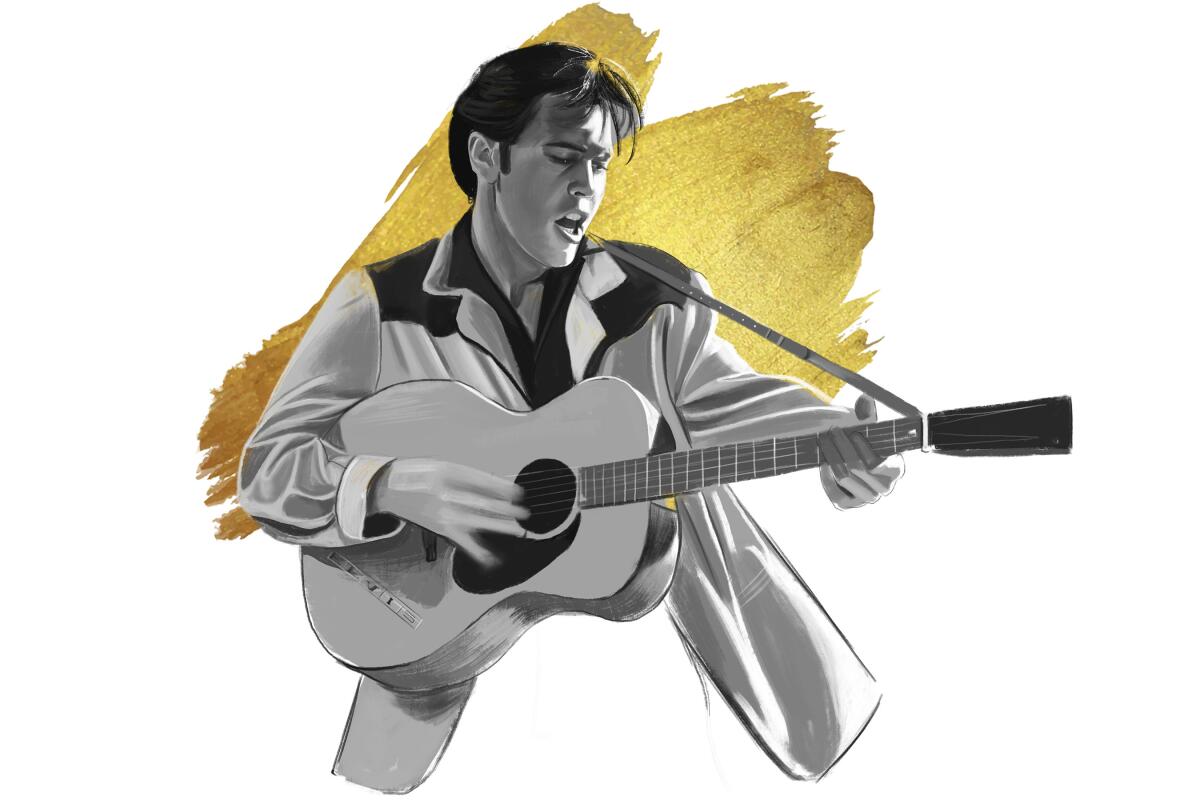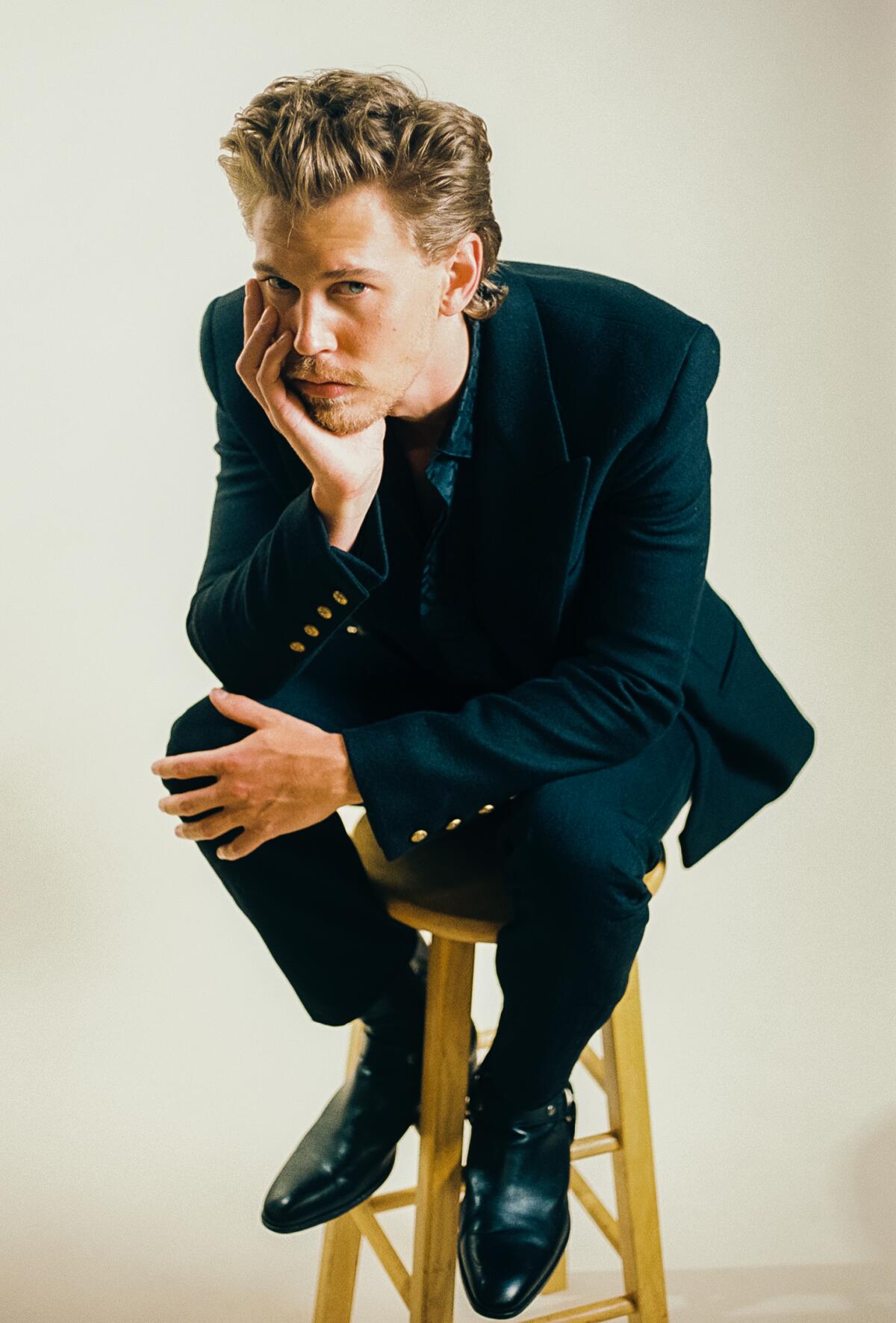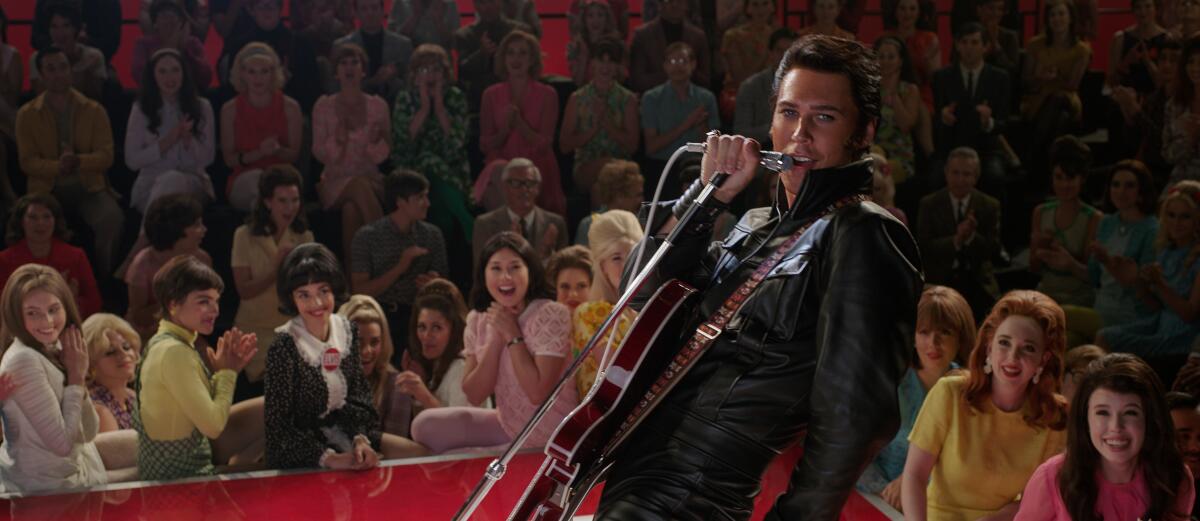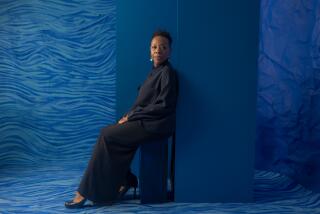Austin Butler thanks ‘clairvoyant’ Vanessa Hudgens for setting him on the road to ‘Elvis’ Oscar

- Share via
Austin Butler received his first Academy Award nomination for his performance as Elvis Presley in Baz Luhrmann’s “Elvis.”
In the film, the 31-year-old Butler plays the musical icon from a pre-fame teenager to his death at age 42. The film explores Presley’s relationship with his longtime manager, Colonel Tom Parker, played by Tom Hanks, and has gone on to be a box office sensation, earning more than $287 million worldwide.
Also nominated for lead actor were Brendan Fraser for “The Whale,” Colin Farrell for “The Banshees of Inisherin,” Paul Mescal for “Aftersun” and Bill Nighy for “Living,” all first-time nominees. Besides Butler‘s nomination, “Elvis” earned seven other nods, including for best picture.
Butler was born in Anaheim and began acting as a teenager, landing roles in TV shows “Hannah Montana,” “iCarly” and “Zoey 101.” Butler made his Broadway debut in 2018 in a production of “The Iceman Cometh,” starring Denzel Washington. He appeared in Quentin Tarantino’s 2019 “Once Upon A Time … In Hollywood” as Manson family member Charles “Tex” Watson, and will also soon be seen in the upcoming “Dune: Part Two.”
For his portrayal of Elvis Presley, Butler has also won numerous other awards, including a Golden Globe, and is currently a BAFTA nominee.

Where are you? How did you find out about the nomination this morning?
Austin Butler: I’m at home [in Los Angeles]. I woke up to missed calls from my publicist and agents, and so it was their voices that I heard first this morning telling me the news.
Have you spoken or been in touch with Baz at all?
Butler: No. I was just actually saying that because I woke up late and my publicist threw me immediately on “Good Morning America,” I basically woke up on the air and have been working my way through the interviews. I think this is my last interview before I get to call Baz.
I can only imagine how bittersweet this must be because of the passing of Lisa Marie Presley. From just a few weekends when you were with her at the Golden Globes to now, what has that been like for you?
Butler: Man, it’s just devastating. The highs have been so high and then the lows so low. It’s really such a roller coaster of a time. And there’s certain moments where it feels really strange to celebrate and a moment like this right now is one of those things that as a young actor, I always saw off in the distance as this thing that almost seemed unattainable. And so to suddenly hear my name listed amongst these other amazing actors as recognized by the academy, it’s so surreal to me. And then I’m also filled with this really intense sorrow because I just wish Lisa Marie was here to celebrate it with us.
What was it like for you to be at her memorial in Memphis just a few days ago?
Butler: It’s all just such a shock. It’s such an absolutely heart-shattering thing that is hard to believe is real. The one thing that I was so moved by was to see so many people come together with this unified love for her and to hear all the stories, different people’s memories, and to get to share mine and to also be there to support Priscilla and Riley and Harper and Finley in this just absolutely devastating time. It’s hard to put into words, it really is.
When the movie was opening, we at the L.A. Times published a story that asked the question: Does Elvis still matter? And I think the success of the movie in part has answered that question, but I wonder for you, what is it about Elvis that still matters, what does his story have to say to us today?
Butler: I think there’s so many different angles we can talk about with that. One key thing that I see, especially for the young people who weren’t very familiar with Elvis, is that rebel Elvis, the one that was wearing eyeliner and lace shirts in the ‘50s and was just so true to what he found inspiring. Even if that meant that he was going to get made fun of by people or whatever. It’s this deep ability to just follow what his heart was telling him he wanted to do. And I think that for all those people out there who are being inspired by him, by how true he was to himself, I think that’s been really cool to see in young people.
I have a lot of people come up to me and say, “I saw myself in him.” And whether it’s artists who are seeing that or people who have other people in the world trying to tell them not to live in a certain way, it’s about pushing through that and being true to what your own vision is. I mean, I could talk to you for days about this.
One things that’s so impressive about your performance is the simple fact that you play Elvis across three decades. Did you approach each time period and the man he was at that moment almost like a different role? How did you handle just the scope of the performance?
Butler: Initially Baz and I had talked about shooting the film chronologically. This is back six months before we even went to Australia. And then very quickly that kind of all went out the window and we realized, because of schedules and everything else, we’re not going to be able to shoot it chronologically. So I knew that I’d have to be jumping from 1956 one day to 1972 the next and then back to the ‘60s . And that sort of jumping back and forth, I knew that was going to be a challenge because when you listened to Elvis’ voice over the years, you realize it changed a lot from 1954 to 1977. So I basically started breaking it down into periods of his life and, I’ve talked about this before, but when this film shut down and I stayed in Australia during that time when we had six months during the pandemic where the film shut down, I basically turned my whole apartment into what looked like a detective crime scene or something. Just images of Elvis that were all chronological throughout his life.
And so I could be in the living room and see every year from the beginning all the way through to his passing and it was also filled with how he changed spiritually over that time and mentally and what his fears were at that point in his life. And so every day that we would film it was a matter of grounding myself in whatever time period that was. And knowing where he’d just come from and where he was just going. And just sort of seeing it through his eyes at that particular point in his life. It’s tricky because it’s not just one voice. And as well as the singing voice changes over that time and the way that he moved physically over that time. Now I’m getting nervous just talking about, just remembering how terrifying that was.

The movie ends with you performing “Unchained Melody” and then it hands itself over to Elvis’ famous rendition of that song shortly before he died. What does it mean to you that the movie ends with the real Elvis?
Butler: I was an emotional wreck the first time I saw it, because of how much I love Elvis and how tender I know his heart was and how sensitive of a guy he was and what great humor he had and the fact that he was so young at that point. I mean, he’s only 42 and yet his body has really gone through it by that point, but to see that little smile that he had in “Unchained Melody” where he looks out at the audience [is] beautiful and heartbreaking. So that’s what I’ve always felt watching that. And then to have lived that and had that moment and I didn’t know Baz was going to cut to the footage that I’d watched a million times and suddenly when it cut to that, it really broke my heart.
After you won at the Golden Globes, there was so much attention to your voice and your accent. How do you feel about that?
Butler: It’s funny to me because I don’t even think about it. I guess after three years of doing everything that I could to focus on this one goal of trying to bring life to Elvis in this film, I think that there’s certain muscular habits that must pop up. If I was trying to sound like Elvis, I would sound very different right now. I think it’s sort of amusing to me how much people want to focus on this one thing. But I’ve had friends who’ve gone and lived in other countries and they come back and they have a French accent or an Italian accent or something like that, or where they’ve gone and lived in the South for a while and they’ve come back. It’s funny how we have these muscular habits that will pop up in ways that we don’t expect.
So especially at the Globes, the first time I’m ever accepting a major award, and if bits of the accent popped up, I mean, what timing.
And then there’s something else I hope you can clear up. You’ve talked about a moment even before you had the role, it was Christmastime, and an Elvis song came on and you were with a friend and you were singing along. And your friend —
Butler: I was with my partner at the time.
Said you should play Elvis. And people have been saying you must have been with Vanessa Hudgens. So that’s right?
Butler: That’s right. We’d been together for so long and she had this sort of clairvoyant moment and so I really, I owe her a lot for believing in me.
So many people have played Elvis before you, and now there’s going to be a new Sofia Coppola film about Priscilla Presleywhere Jacob Elordi is playing Elvis. Do you know him? Have you spoken to him about it?
Butler: No, I haven’t. I’ve met him before, but we haven’t spoken about that at all.
Would you have any advice for someone about to play Elvis?
Butler: There’s no quick answer for that. Other than I wish him all the best.
If you’re gonna put on an Elvis song today, which one do you think you’d put on?
Butler: You know what first pops into my mind is “I Got A Feeling in My Body.” That’s one of his joyous songs, “I got a feeling in my body.” It’s such an upbeat song and that just feels right for right now.
More to Read
Only good movies
Get the Indie Focus newsletter, Mark Olsen's weekly guide to the world of cinema.
You may occasionally receive promotional content from the Los Angeles Times.











